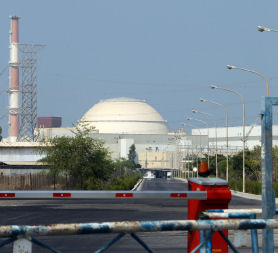Iran: nuclear ambition
What next in Iran’s nuclear plan? President Ahmadinejad says “we don’t have to tell you everything”. Science Correspondent Julian Rush visits a civil nuclear power station on the Persian Gulf coast.
In June 2010 the UN Security Council approved a raft of new sanctions on Iran over its nuclear ambitions.
Tehran responded by insisting the programme is for electricity-generation only, but western governments remain suspicious Iran is enriching uranium to build a bomb.
President Mahmoud Ahmadinejad dismissed the sanctions as “annoying flies” as useless as “used tissues”.
Back in 2006, Science Correspondent Julian Rush gained access to a site at Bushehr where Russian engineers were helping the Iranians finish constructing the country’s first civil nuclear power station.
Chairman of Iran’s Parliamentary Energy Committee Kamel Daneshyar told Channel 4 News: “From construction of the nuclear power plants to the manufacture of nuclear fuel, we invite countries to come into partnership with us.
Ahmadinejad dismissed the sanctions as ‘annoying flies’ as useless as ‘used tissues’.
“Fifty-fifty with English, European even American partners, Chinese, Japanese, Indian, we’ll work with them.”
Iranian political observers believe the government’s nuclear policy of demanding the right to enrich uranium is based on a consensus between factions: nuclear power moderates agreeing to support a more “hawkish” group, so long as they stop at enrichment.
But enrichment is the stumbling block. The International Atomic Energy Agency (IAEA) has numerous examples of Iran’s continued reluctance to cooperate. Iran has refused to make clear the role of the military and is believed to possess documents relating to the making of a nuclear bomb.
Secretive state
Iran has repeatedly been accused of hiding plans to make a nuclear warhead.
In September 2009 President Obama, flanked by former PM Gordon Brown and the French president Nicolas Sarkozy, demanded that Iran cease a "direct challenge" to the international community. Russia and China also urged Iran to cooperate.
It followed the apparent discovery of a secret nuclear enrichment plant by inspectors.
President Obama said: "This site deepens a growing concern that Iran is refusing to live up to these international responsibilities."
In response the Iranian president, Mahmoud Ahmadinejad, insisted there was no secrecy involved, but has also said "we don't have to tell you everything."
The west suspects the “hawks” will go beyond enrichment and their stated position that they so not want nuclear weapons now – just the potential to build them, should the need arise.
Professor Nasser Hadien, a political expert at Tehran University, spoke to Channel 4 News about Iran’s nuclear ambition.
He said: “They [the hawks] would argue that we have to develop nuclear weapons capability.
“They would like to make a distinction between the capability and weapons themselves. So they would argue that if we have the nuclear weapons capability that would give us effective deterrents.”
Iran intends to build 10 to 15 nuclear power stations, similar to the site at Bushehr, over the next 20 to 30 years to meet the soaring energy needs of a growing nation.
It is also a matter of national pride with Iran – a country rich in oil and gas – believes it has a “right” to develop nuclear energy.
Ali Ghezelbash, Associate Director of Atieh Bahar Consulting, explained.

“Iran needs to export its oil for hard currency income, if we merely to use the oil and gas domestically I’m sure Iran could survive for another 150 years.
But the point is, are we going to use this for self-sufficency, just to burn up the oil or are we going to use this to strengthen the economy?”
Iran’s government has enjoyed popular support over its nuclear plans – the programme appeals to national pride.
However Ahmed Shirzad, from the Participation Front Party, told Channel 4 News: “Ordinary people feel that we have found something very important and we should defend it.
“…but when engineers are asked whether it is efficient or useful they disappear.”
If Iran does eventually compromise with the international community, there may be a domestic price to pay.
Professor Nasser Hadien added: “What the government is doing is a mistake. The government feel they can manage that in the future. But I think they will pay a cost.”
Russians fuel Iran’s nuclear future
The fuel needed to launch Iran’s first nuclear power plant was transferred to the plant building in Bushehr in August 2010.
Pictures broadcast by Iranian state TV appeared to show deliveries to the Russian-built power plant 683 miles south of capital Tehran.
Russian engineers will load nuclear fuel rods into the reactor – an irreversible step marking the start-up of the plant.
The west has been critical of Russia’s involvement in building Iran’s first nuclear power plant but the Russians says it is purely civilian and cannot be used for any weapons programme.
Iran’s nuclear chief has said he will push ahead with a major expansion of the country’s uranium enrichment capacity.